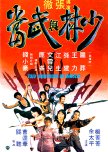
This review may contain spoilers
An under-rat-ed making of a failed Kaiju mockumentary
(Warning! Rat puns ahead!)Director Yokokawa returned to the mockumentary by giving Kaiju fans an imagined look into the making and scrapping of the 1964 film Giant Horde Beast Nezura. Yokokawa displayed his devotion for the genre and once again made sure that a bit of Tokusatsu history was not forgotten. Before there was Gamera, Daiei began production on their vision of a giant monster to compete with Toho-a horde of rats! This short film showed an enor-mouse amount of love on a tiny budget for the forgotten terrors.
The movie was largely in black and white as if the filming was done in 1963. The film starts with the executives brainstorming ideas for their next big hit. Feeling that their competitor (ahem, Toho’s Godzilla) had grown stale they sought out a new monster to fill the void. After watching Alfred Hitchcock’s Birds and being inspired to use a more common animal, the vile enemy was agreed upon…rats. They also decided to use real rats for filming with their miniature sets. The “documentary” takes us through the miniature set making, the model creator, and the crew trying to make the rats more menacing. Ultimately, they took a truck up and down the streets offering to pay 50 yen for every rat given to them. The street rats were much more active. Unfortunately, they were also carrying fleas and disease. The powers rat be at the Bureau of Public Health upon hearing complaints from nearby residents shut them down. In real life and alluded to in the film, the rats were doused in oil and set on fire to dispose of them more humanely. I doubt the rats thought it was that painless.
I’m not sure who thought rats were a great idea for a film, they are notoriously difficult to work with. Everyone has heard the horror stories of how demanding Jerry was while Tom was a real pussycat to get along with (ancient Tom and Jerry cartoon reference). Jokes aside, because of the difficulties the movie was abandoned after only 3000 ft were shot. This mockumentary did not use any of it, if any footage is still in existence, nor any photo stills. The model for the super giant rat was tusked and frightening. It’s no sec-rat that if they’d stuck with just a guy in a rubber suit and not used disease carrying rodents, the film would have been completed.
Yokokawa gave Nezura the star treatment with a mice little theme song, a jaunty number, sung by Gamera Super Monster’s lead female alien (Fumiake Mach)! Once again Yokokawa preserved a Kaiju from complete obscurity and did so with much respect. The Great Buddha Arrival was more ambitious than this project but his passion for his subjects comes through on the screen, even when using people with little or no acting skill and a miniscule budget. I found the behind the scenes making of the miniatures worthwhile and the filming of rampaging rats interesting even when they were hilariously just sitting around licking themselves.
Though Nezura was canceled before he came to movie life, in his wake, a guardian awoke-Gamera the Invincible in 1965. Gamera would go on to become the guardian of little children. Hindsight says a turtle ended up being a safer choice than a horrifying rat. Gamera squeaked away with the win!
For Kaiju enthusiasts this is an entertaining short film to check out, to see what might have been. There’s nothing earth shattering or rat-ical about it, simply an hour to support one man’s passion for our beloved Kaiju. Sorry for the puns, I was just trying to a-mouse myself.
1/27/23
¿Te ha parecido útil esta reseña?

This review may contain spoilers
Naruse's earliest surviving film packs a lot of heart into a short amount of time
Flunky, Work Hard aka Little Man, Do Your Best is the earliest surviving Naruse Mikio film. The film clocks in under 30 minutes but manages to pack a lot of story into the short amount of time. Comedy and tragedy are both on display in this 1930’s rural Japan slice of life film.Okabe is a life insurance salesman with few prospects, doing the best he can to support his family. We know the family is struggling when he attempts to repair his shoe in an early scene with newspaper. Their hut lies near sewer pipes and in a foreshadowing move, the railroad. The wife may voice her displeasure at their financial circumstances but she works hard and deals with disgruntled neighbors and the landlord while meek Okabe hides. His precocious son, Susumu, keeps running afoul of the local wealthier kids. Susumu dishes it out as good as he takes it, making a name for himself. Okabe, meanwhile, is willing to demean himself in order to make a sale, even allowing kids to play leapfrog with him in an effort to win over the mother. In a pivotal moment, he argues with Susumu after his son has fought a potential client’s child, leading to dire consequences. Okabe’s desire has been to provide for his family and he wants to buy his son a toy plane. In the end, his efforts may have come to naught when he realizes what his actions have caused.
I know Naruse primarily through his films centering on a strong woman doing what needs to be done for herself or her family. In this film, he focuses on a father who loses sight of what was important while trying to make a living during the Depression. Though short, the film was entertaining. Naruse used a variety of camera effects to convey characters’ emotions. The version I watched had no music but I’ve come to accept this with these much older films along with the degraded film quality. The story was straightforward enough that the placards were hardly necessary but the few in the film were effective. Naruse gave us an insight into 1930’s rural Japan with this small family that has managed to survive the years. Though the ending may have been heavy handed, comedy, tragedy, and irony, all played their roles in this heartwarming film focusing on a struggling father and his love for his son.
1/26/23
¿Te ha parecido útil esta reseña?

This review may contain spoilers
Lots of high flying kicks not encumbered by a coherent plot!
Cynthia Khan returns to the In the Line of Duty franchise for Middle Man. This 1990 film feels more like an 1980’s Hong Kong martial arts movie. Lots of fighting, very little plot.Cynthia is joined by David Wu in this convoluted story that goes from Hong Kong to Korea. It involves the US military, CIA, HK police, and an underground information spy ring. Wu’s David is accused of spying and the race is on to see who can kill him first. He has to drag around the dumbest girlfriend ever for awhile until the writers mercifully divest him of her. Khan’s Inspector Yang Li Ching helps her cousin elude the murderous gang, CIA, and police so that they can hunt down The General and collect evidence to clear David. David is not the smartest seaman on leave making Inspector Yang’s job even tougher trying to keep him alive.
The thin plot only served to grant space for the fights, lots and lots of fights. Most of them were well choreographed with a minimum of wire-fu and cranking. Khan was quite proficient and believable as she athletically ran, kicked, leapt, slid, and even dangled off of buildings and ropes. She lacked some of the onscreen personality of say Michelle Yeoh, but was likeable enough in this role. Wu was adequate but not terribly charismatic. Lo Lieh, at nearly 60, showed up as the gentle godfather who still had a few moves left. A nice surprise was Australian Kim Penn, a real-life martial artist and member of the Hong Kong Stuntman Association who made a beautiful foil for Khan as they had one of the bloodiest girl on girl fights I’ve seen in some time.
Middle Man was an entertaining martial arts movie if you don’t pay attention to the plot and just enjoy the fight choreography. It’s rare that a female lead is allowed to carry a gun toting, fists and kicks movie, so I bumped it up a bit in my rating.
1/25/23
¿Te ha parecido útil esta reseña?

This review may contain spoilers
"You'll learn to love me, the lessons are free." Don't bet on it.
The Lower Depths refers to a group of impoverished tenants living in a building that is propped up with beams and the cliff it leans against. It’s a dark comedy about people who have no hope for tomorrow, living close to the edge of death and pennilessness.The film is based on the Russian playwright Maxim Gorky’s 1902 play. Most of the film is set inside the dilapidated tenement as if it were a play with characters walking on and off stage. The technique can make for a claustrophobic experience as if you were trapped in the room with straw covered floors and unlikeable characters and like them have no means of escape.
The film is one long unending conversation between the different characters. They spend their time complaining about their lot in life and complaining and gossiping about each other. There’s a tinker, a prostitute, a husband and wife, a thief, a cheating gambler, and an alcoholic cohabitating in the great room with bunk beds. Their usual tirades are broken up by the appearance of an older man, nicknamed Grandpa, who brings a bit of wisdom and compassion to the bickering group.
This was my least favorite Kurosawa by far. I didn't find any of the characters or performances particularly compelling. Even the charismatic Mifune Toshiro struggled to bring the thief having an affair with the landlord’s wife to life. The characters complained about their lives incessantly, but even when Grandpa tried to tell them there might be something better away from the toxic environment none of them took a chance to make the move. Only one did and it ended in utter disaster. Kurosawa at least got his consistent view of women out of the way in the first scene by having a character state that all women are liars.
There is much discussion about when telling the truth is bad and telling a lie is good. The benefits and downfalls of money is also discussed. “Money buys your fate in hell.” “Human kindness can’t be bought with pennies or silver.”
I suppose I need more white space, and this film had too many words crammed together from beginning to end with scarcely a breath or compelling action taken between them. Acts of compassion were few and far between causing the characters to not resonate with me. This room full of characters failed to enlighten me on the social plight of the poor, the failings of the state, or how people even in dire situations look out for each other. Though there were moments of almost grudging kindness there weren’t any likeable characters, with the possible exception of Grandpa. Truly by the last moments of the film with its extremely abrupt ending, I wasn’t sure what I was to take away from this story other than a window into a deeply flawed group of impoverished people trying to get through the day knowing that when tomorrow comes it will not be any better.
If you are interested in watching a Kurosawa film, this is not the one to start with. If you are a Kurosawa fan, this is a must see, as it differs from the films preceding it and is worth a look.
1/6/23
¿Te ha parecido útil esta reseña?

This review may contain spoilers
Kaiju sushi anyone?
Gamera vs Guiron was my first Gamera movie. I watched it several years ago before knowing anything about this franchise. Two boys accidentally go into space in a strange ship and a giant turtle with flames coming out his backend comes to their rescue on the 10th planet hiding behind the sun? Yeah, I'm the person who will sit down and watch that.The two mischievous boys witness a spaceship landing and board it without any forethought. It closes up and heads for home via an asteroid belt. Fortunately, Gamera hears the boys and protects them. The spaceship flies faster than he does so the boys end up on a strange planet where the water runs backwards and giant kaiju inhabit the place before Gamera can get there. They are greeted by two space women who look a lot like an early Frieza from Dragon Balls. If you are not a 10-year-old boy, the middle of this movie can get tedious, even with silver clad cannibal space babes.
Fifty minutes into the story, Gamera finally shows up and duels with a giant land shark with a huge blade coming out of his head. Guiron also has some nifty throwing stars that shoot from his body. The first fight doesn't go well for the big turtle but the first one never does. When Gamera collects himself and starts the fight over we are witness to him doing a gymnastic bar routine with a perfect 10 dismount. In only his 6th outing, it felt like Gamera had jumped the blade faced shark.
Gamera was fully a friend to children by this time. The boys weren't too annoying but I could have used less time on them and the space women overall. The mothers were belligerently obstinate in disbelieving the little sister who had witnessed the boys getting on the spaceship. One mother was wanting to give her son 30 lashes for running away. Eventually, some grown-ups appeared to let them know the child wasn't lying. These two women were the most exasperating part of the whole movie.
By the time Gamera was shooting across space, heading home with the boys in tow, his theme song blaring you know everyone has learned their lesson. The mothers understood they should trust their children. The boys decided it was better to make Earth a safer place to live than looking to somewhere in space. And Gamera, well, Gamera was probably looking for a place to refuel after traveling across the Solar System and back. Let's go Gamera!
¿Te ha parecido útil esta reseña?

This review may contain spoilers
"The world is dark. Life is just a dream."
Director Kurosawa once again asks what does it take to be happy in a violent and unpredictable world? This time he frames that theme in a 16th century escape picture with a spunky princess, a stalwart General, and two greedy idiots.Two peasants who have escaped from capture and grave digging are the eyes into this story. Much like C3PO and R2D2, they are the lowest ranking people in the movie and it starts and ends with them. Always on the hunt for gold, their greed defines their relationship which is filled with endless squabbling and fighting. Once they find two hidden pieces of gold, whetting their insatiable appetites, Mifune appears as General Rokurota Makabe. Little do the two vagabonds know that their simple escape plan from the occupied country saves their lives. Rokurota enlists their help in transporting gold and a young woman to safety. Of course, Yuki is no mere scantily clad youth, she is a princess, the last remaining hope of her clan Akizuki (Alderaan anyone?). The princess was raised as a boy and is headstrong and courageous.
Yuki actually seems to be enjoying their time on the run, reveling in her freedom. Rokurota , ever the traditionalist, struggles to deal with her egalitarian ideas. Kurosawa is once again bucking the old world order and class systems. The two scoundrels have little loyalty and are only in the deceptive march through enemy territory to survive and get their hands on the gold. Because of their greedy actions they endanger the small group on several occasions. Yuki has Rokurota buy the freedom of one of her people who has been sold as a sex slave, against Rokurota's judgement. On the road they are accosted by soldiers and Rokurota has to engage them in battle and chase two of them down on horse. This particular scene was magnificent. No fake horse head bobbing up and down, Mifune with sword extended chases his enemies down. Brilliant. He ends up in the enemy camp where he challenges the leader, General Tadokoro, to a duel which Rokuroto wins and shows mercy to his conquered foe.
The small group ends up at a bonfire where the locals are singing, "The world is dark. Life is but a dream." The princess really listens to the words and smiling joins happily in the dance. Afterwards due once again to the scoundrels greedy actions, the princess, her general, and the maid end up captured. An embittered Tadokoro faces them before their deaths and the princess' dignity and words have an affect on the enemy. Will he choose tradition or make the morally significant choice?
All of the main characters are faced with choices and have to choose whether to remain in a rigid system or to pick a different more merciful way. Sometimes kindness is rewarded, sometimes it is not. As always, even in this comedy, the world is shown as a dangerous place.
I should take a moment to explain my Star Wars comments. It’s common knowledge that George Lucas drew inspiration from this film for the original Star Wars though it looked to me minimally. Kurosawa drew inspiration from the American director Ford, who filmed epic Westerns. For me this film seemed more like The Good, The Bad and The Ugly. And of course Leone was inspired my Kurosawa. Art is at its best when people draw ideas from different sources and beyond artificial boundaries and then utilize them in a different manner.
We’re all richer for it.
I didn't care for the two scoundrels whatever they were intended to be, everyman, caricatures, or just a couple of bad guys in need of redemption. Their greed, fighting, betrayals and rapey longings for the princess turned me off. They may have been exhibiting some of man's baser nature but drawing straws to see who would rape the princess turned me off.
Mifune Toshiro was perfect as the General bound to protect the princess at all costs, going so far as to sacrifice his sister. Lithe, athletic, and quick, he showed what he was capable of during the lengthy spear fight with Fujita Susumu's Tadokoro. Fujita as a more moral Darth Vader gave a depth, honor, and humor to the old general. For me, the weaker cast member was Uehara Misa as Princess Yuki. When she played a mute, she did well acting with her eyes and facial movements. Even without speaking she guided the action, always brave and assured. But when she spoke she was usually yelling which was distracting. Goes back to yelling doesn't make a woman strong.
Kurosawa's use of wide screen shooting brought an epic style and feel to the film whether it was the valiant group trekking through the mountains, dark forest, or riding horses over the hills. I love how he was able to show people in the forefront, middle and background in the city scenes giving great visual depth.
One thing that always shocks me when watching these older samurai films is how little clothes some of the men wear. Modern samurai films cover them all up. Even Princess Yuki was in what amounted to shorts. The characters and extras all looked real--dirty, sweaty, and with messed up hair. They showed a variety of war gear and weapons as opposing forces engaged. The first fortress may have been battered by war, but was still impressive and some of the shots, especially during a slave revolt were visually a treat. The world Kurosawa and his team built felt truly inhabited.
Throughout the film, characters were required to choose. Will they continue to live the illusion, a world guided by greed and violence? Or will they let go and live a life where everyone can be happy? Or is it even possible in this dark world? Can people let go of the past's traditional shackles and be treated equally and kindly? Or is it a never ending cycle of pain? The Hidden Fortress may have been a comedy with exciting fights and a thrilling escape, but underneath it wanted to be bigger and seek to escape more than just a mortal enemy but a divisive suffering existence as well.
10/27/22
¿Te ha parecido útil esta reseña?

This review may contain spoilers
Silence is a virtue?
Don Wong Tao played the silent fighter seeking revenge for his father's murder. Woe to all the tributaries of the Black Dragon Gang as he rampaged his way across the evil doer's territory.Along Comes the Tiger was a flawed but entertaining kung fu movie. With the twist of a mute hero avenging the death of his father by the infamous Black Dragon, it slightly set itself apart from the crowd. Theoretically based on Once Upon a Time in the West, which I'll have to take it on faith, because aside from a couple of scenes I didn't notice the western influences.
Miracle Man's first fight with a young Phillip Ko Fei was entertaining due to the fact that the bad guy's character was OCD. Suffice to say, Miracle Man messed him up much to the baddie's chagrin.
Doris Lung Chun Erh fought Miracle Man with her female gang, wielding fans with daggers hidden within. Stephen Tung who was the martial arts director for many movies played a government agent trying to clean up the gangs. He appeared and disappeared seemingly at random. A little boy attached himself to Miracle Man in a role meant to bring out the compassionate side of MM but instead was annoying. MM had only one goal in life and that was to take out the Black Dragon Gang's leader. When someone is rampaging in a kung fu movie, not much will stop the carnage.
Stephen Tung and Don Wong did an acceptable job with their fights and acting. One scene with a couple of minions was quite well choreographed. Director Wu Ma showed up to try and take on the MM as well, and as always, he was entertaining to watch. Gam Ming aka Tommy Lee played the dastardly Black Dragon, a humpbacked martial arts master. He also choreographed the fights for the movie. For the most part, most of them were quite well done. I only found the final one a bit of a letdown.
The acting was slightly above what you might expect from what appeared to be a low budget film. Don Wong Tao's character seemed to benefit from playing it silent. The only drawback for me was the kid, though it seemed they were trying to bring things full circle since MM had witnessed his father's death. The story had some weird lapses of logic, especially where the female characters were concerned. If you can overlook the shortcomings there was decent kung fu flick to be watched.
For martial arts movie fans, particularly older ones, this might be one to give a try sometime. It was non-stop action from beginning to end and didn't feel like each fight was a duplicate of the others.
¿Te ha parecido útil esta reseña?

Gamera: Guardian of the Universe
A 0 usuarios les ha parecido útil esta reseña
Hero on the Half Shell!
Gamera was given a much needed make-over in the 1990's. This Gamera was not only deadly but also a guardian created by an ancient race. Good thing, because just as Gamera was awakened so were a flock, gaggle, murder, probably the latter, of people eating bat-birds, the Gyaos. In their original 1960's confrontation, Gyaos was referred to as a bat, here she was referred to as a bird.When the humans decided to lure the ravenous bat-birds to the new baseball stadium so that they could trap and weaponize, I mean study them, Gamera wasn't having it and came to eradicate Tokyo of the dangerous creatures. Like the original Gyaos, this bat-bird could emit green sonic rays that could cut through almost anything.
Gamera could hold his tusked head high in comparison to 1990's Godzilla. This time around there was no annoying child which helped my viewing experience enormously. There were the requisite scientists, condemnations of pollution and nuclear waste, inept leaders and military, and the special child who communicated telepathically with Gamera. The thing Gamera gets right is that the monsters were never far from the screen. The battles were big as were the stakes. The shadow of Jurassic Park could be seen occasionally but that's a small quibble. The rubber suits and primitive CGI are not drawbacks in these Kaiju movies, but part of their charm. The miniatures were quite good as well.
This was a popcorn movie simply designed to entertain. Though darker than most previous Gamera movies, it was still a giant turtle who could fly by burning off his own methane excretions. And that's something you don't see every day. If you are a fan of Kaiju movies, this might be one to try. And if you are a Gamera fan, this one should certainly be on your list to watch. It was worth seeing Gamera given the respect and story he deserved.
¿Te ha parecido útil esta reseña?

Opium and the Kung Fu Master
A 0 usuarios les ha parecido útil esta reseña
Just Say No to Drugs!
Just say no to drugs--even if you are a kung fu master!While Opium and the Kung Fu Master follows the standard kung fu movie formula it does deviate by interjecting a real story with real consequences in between fights. Master Tie Qiao San (Ti Lung), one of the famous Ten Tigers of Kwantung, protects the village where his school is located from evil doers. Robert Mak as Lu Gua Si is his protégé, a good-hearted if not completely proficient fighter. Chen Kuan Tai's Rong Feng is an opium dealer who joins forces with the opposing school's leader, Zheng Hong, played by Lee Hoi Sang. The bad guys set up an opium den and one by one the village men begin to succumb to the siren call of the opium, forgetting their jobs and families. Master Tie San is not immune and falls victim to it as well, losing his kung fu abilities. His addiction gives the Big Bads run of the town and in the process Tie San loses loved ones because of his inaction.
The acting was about average for a kung fu film. Ti Lung was adept with his kung fu skills and projecting the calm, skilled martial arts master, but stumbled at times as a recovering addict. Chen Kuan Tai seemed to relish playing the Bad Guy, all he needed was a long mustache to twirl. Robert Mak pleasantly fulfilled his assignment of playing the earnest young fighter who tried to wake his master and the villagers from their stupor before it was too late. Overall, the acting was sufficient in this one, though there were a few deaths which made me giggle with their abruptness.
This was Tang Chia's third and last film as a director, he was better known for his work as a martial arts director. It's a shame he didn't helm more kung fu movies as he did a good job with this one.
The fights and choreography were fast, fluid and involved fists, kicks, and various weapons. The main actors were all proficient in martial arts and made the fights believable. No dancing around and posing in this movie. Though there were deaths, the gore was kept to a minimum.
Even if Opium and the Kung Fu Master isn't perfect, it's not a bad way to spend 85 minutes if you enjoy old kung fu movies. Just say no to drugs, but yes to this movie or at least maybe.
¿Te ha parecido útil esta reseña?

The story is the familiar, “you killed my loved ones, prepare to die!” revenge plot. After being beaten by the bearded master Liu must train in new styles. What gave this movie a positive twist for me, as in the last one, it was a woman who gave him the additional guidance he needed. Kara Hui plays the woman who helps him and she is a joy to watch fight and train. Liu must open his mind as he learns a woman's style and control over his abilities. He was in fine form in this movie, displaying three different kung fu styles.
Lau Kar Leung directed the martial arts scenes, of which there were many. He is becoming my favorite kung fu choreographer. Unlike some movies, the fighting is fast and furious, still slowed down enough to follow but not the more tedious staged posing fights. One scene with a mostly naked Lo Lieh fighting as he comes out of his luxurious hot tub, trying to get dressed while fending off Liu, was fun to watch. Normally in kung fu movies it's the women who have to bare it all for the camera. It's nice to have the roles reversed for once.
The sets and costumes weren’t as nice as in some Shaw Brothers movies. The version available to me was dubbed which is always a disappointment. Lam Fai Wong played the comic side-kick and punching bag, but a little of him went a long way.
Clan of the White Lotus made for an entertaining, but most likely not memorable, 90-minute watch. Lo Lieh's villain is what I will most likely carry with me. As always, I’m slightly generous with my kung fu scores recognizing they were for a specific audience forty years ago on limited budgets.
¿Te ha parecido útil esta reseña?

Two Champions of Shaolin
A 0 usuarios les ha parecido útil esta reseña
I found the story tedious as there was very little emotional depth to any of the characters. The good guy Shaolin disciples were laughably gullible and the Wudang bad guys were ruthless to the core. The only glimmer of an interesting story to me was Chin Siu Ho's character who was caught in between the two factions, always trying to do the right thing even when he wasn't sure what it was. The movie felt like it was three hours long. I kept checking the clock to see if time was slowing down as I watched it.
The poor Shaolin fighters sported bad Bruce Lee wigs with a long braided ponytail like a bad mullet gone even more horribly wrong. Aside from the two female characters I don't think anyone was on makeup duty for this movie either except to apply "blood" where needed. Chang Cheh had a reputation for being cheap and it showed in the sets and costumes as well.
Chang also had a reputation for bloodiness in his movies and he fulfilled that as well. One person was killed by having his family jewels ripped out, another had blood spurting out of his head. The body count was high in this one. The only positive for me in this movie is there were very intricately staged fights, often among numerous participants with fists and a variety of weapons. Chiang Sheng, Lu Feng and Philip Kwok choreographed some very creative fights. Lo Meng is the bigger fighter and he relied on his power while Chiang Sheng is smaller and more acrobatic. Having said that, the fight scenes felt more like a dance routine with lots of posing and not a lot of connections with fists or feet.
I would have rated this movie lower except that I was impressed with the work and coordination that went into the duels and three ring brawls. In the same way the kicks and punches never seemed to connect, this movie didn't connect with me either.
¿Te ha parecido útil esta reseña?

Math Kills
Lo Lieh plays a local constable who is after a group of murderous bandits. Some of kung fu's heavy hitters play the four baddies. One villain uses a golden abacus and spins golden balls of death into his opponents. One bad buy uses geese shaped throwing stars. The Big Bad has a spinning umbrella of death and a rod with a chain that has a blade attached at the end so that he can reel an opponent in(killer fishing rod?).No emotional depth to this movie. Lots of bloody sword fights. Lo's men always seem to be underprepared or vastly outnumbered. This movie will also help explain the old saying of, "I'll be waiting for you in the tall grass."
Lo's character wasn't terribly bright-- the bad guys had been hiding in plain sight for two years, but that's okay because eventually he is helped by the equally not too bright blind daughter of the Big Bad. If ever there was a couple made to be together these two pretty people are it. It's a kung fu movie so what could possibly go wrong?
Some of the reasons to watch are as always for me Lo Lieh. He's gorgeous, looks dangerous, and is adept at the fight scenes. Li Ching plays the beautiful and pure of heart blind daughter. A young David Chiang plays LL's brother and it's a who's who of supporting characters. With all this talent and Chang Cheh directing there is plenty of action to go around.
The music was fine, the cinematography wasn't bad and the movie was in pretty good shape. I say that because some of these movies have been edited to fit different screens and sometimes the subtitles either run off the screen or have two languages overlaid.
I wouldn't trip running to the TV or your computer to watch it, but if you have an hour-and-a-half to kill, it's never a waste of time spending it with Lo Lieh and friends.
¿Te ha parecido útil esta reseña?

The first twenty minutes or so are scenes of Pei Pei's clan being decimated by the Big Bad and his endless stream of murdering, torturing, minions. Lots of spurting blood, but after awhile tedious to watch. Her fortunes changed and so did mine when Lo finally showed up. A little romance in the last part of the movie gave Lo and Pei Pei's characters more depth, too bad the writers didn't develop the relationship earlier and better.
The clarity of the movie was a relief, some of these old kung fu movies have lost much of their visual integrity and sound. Fortunately, this version of the movie was NOT dubbed on Amazon Prime.
Final evaluation, most likely a movie for Lo Lieh or Pei Pei fans or those working their way through the Shaw Brothers inventory.
¿Te ha parecido útil esta reseña?

I enjoyed this kung fun movie which was more sword fighting than hand-to-hand. The plot was coherent, the sword fights were creative and entertaining, the story moved along at a good pace, and it actually had a proper ending. Too many kung fu movies throw up the ending credits the second the final fight is over. This one took a couple of extra minutes to wrap the story up. Lo Lieh also pulled one of the best moves I’ve ever seen in a sword fight when his sword was broken.
This movie must have been remastered because the color and lighting were vibrant. The outdoor sets were well done, especially the kiln scenes. Given it was a Shaw Brothers movie the indoor sets had enough wooden furniture and walls to be broken to bits during the fight scenes. Unlike some kung fu movies the acting was natural and not over the top. Lo Lieh, Li Ching, Wang Hsieh, and Chen Yan Yan did admirable jobs of conveying their parts.
There were no snakes in this movie, despite the title, except for the sleazy human kind. People did lose body parts during the fights-a forewarning if you are very squeamish.
Valley of the Fangs was an entertaining way to spend 90 minutes on a Sunday night.
¿Te ha parecido útil esta reseña?

Lo Lieh is trying to find his master who was betrayed by his own brother. Besides betraying his brother, Carter Wong is busy manipulating a tournament to select the next chief so that it will end in his favor. Lo Lieh goes for the twofer and attempts to find his master and stop Carter Wong. There are double crosses, double-double crosses, twists and turns and of course a lot of fighting. Killer from Above does inject a little levity into all the death and betrayals.
The biggest drawback to this movie is the camera work. It’s like the director figured out some tricks he could do with the camera and threw in a lot of ridiculous shots: the swirling shot, upside-down shot, rapid close-ups and the like. Fortunately, he seemed to tire of them after the first quarter of the movie and settled down for the rest.
I’m always pleased when a kung fu movie has a plausible plot and follows through fairly logically and the twists and turns make sense. In that, this movie succeeded. Above all, Killer from Above has a great cast-Lo Lieh, Carter Wong, Lung Fei, and Cliff Lok. I grade Kung Fu movies on a different scale because these movies were for a specific audience 40-50 years ago. Killer from Above may not be an award winner but Lo Lieh and Carter Wong were entertaining, the fights were good and the story was engaging. If you enjoy kung fu movies, it’s not a bad way to spend 90 minutes.
¿Te ha parecido útil esta reseña?

 31
31 98
98 7
7





















